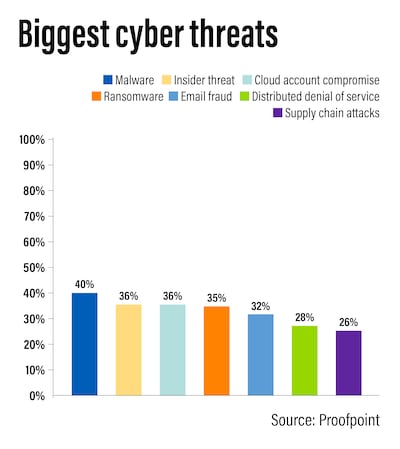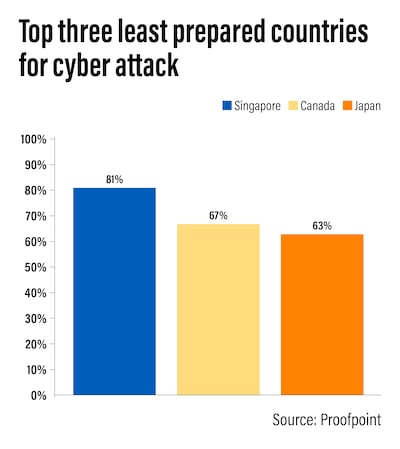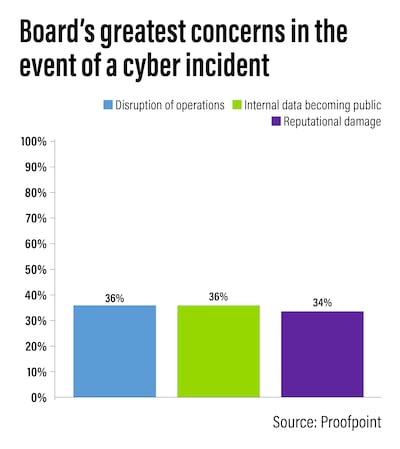Generative artificial intelligence is one of the most promising technologies riding the AI wave, but businesses are also concerned about the potential risks it carries, a survey has found.
Nearly 59 per cent of board directors globally consider generative AI tools – such as Microsoft-backed ChatGPT and Google’s Bard – a potential cyber security risk to their organisation, according to US technology firm Proofpoint.
Board members have those concerns even though more than 70 per cent of them view cyber security as a priority, 72 per cent believe their board clearly understands the cyber risks they face and 70 per cent consider they have adequately invested in the security framework, Proofpoint said in its second annual report, Cybersecurity: the 2023 Board Perspective.
Investors have put more than $4.2 billion into generative AI start-ups in 2021 and 2022 through 215 deals after interest surged in 2019, recent data from CB Insights showed.
Globally, AI investments are projected to hit $200 billion by 2025 and could possibly have a bigger impact on gross domestic product, Goldman Sachs Economic Research said in a report last month.
“Our findings show that it remains a challenge to translate increased awareness into effective cyber security strategies that protect people and data,” Ryan Kalember, executive vice president of cyber security strategy at Proofpoint, said.
“Growing even stronger board-CISO [chief information security officers] relationships will be instrumental in the months ahead so directors and security leaders can have more meaningful conversations and ensure they are investing in the right priorities,” Mr Kalember said.
Proofpoint’s report examined third-party survey responses from 659 board members at organisations with 5,000 or more employees across different industries.
It covered 12 countries: the US, Canada, the UK, France, Germany, Italy, Spain, Australia, Singapore, Japan, Brazil and Mexico.
Nearly three-quarters (73 per cent) of those surveyed feel their organisation is at risk of a material cyber attack, an increase from 65 per cent in 2022. Nearly 53 per cent of respondents said they were unprepared to cope with a targeted attack, up from 47 per cent last year.
“This year-over-year change may reflect the ongoing volatility of the threat landscape, including lingering geopolitical tensions and rises in disruptive ransomware and supply chain attacks,” Proofpoint said.
Nearly 84 per cent of respondents believe their cyber security budget will increase over the next 12 months.
However, these efforts are not leading to better preparedness as still 53 per cent view their organisation as unprepared to cope with a cyber attack in the next one year.
Among the biggest threats, board members ranked malware as their top concern (40 per cent), followed by insider threat (36 per cent) and cloud account compromise (36 per cent).
Nearly 37 per cent of board directors said their organisation’s cyber security would benefit from a bigger budget, while 35 per cent would like to see more cyber resources and better threat intelligence.
Personal liability is also a concern for boards. Almost 72 per cent of board directors expressed concern about personal liability in the wake of a cyber security incident at their own organisation.
Some of the top concerns of boards in the event of a cyber incident at their organisation include disruption of operations (36 per cent), internal data becoming public (36 per cent) and reputational damage (34 per cent).
“Board members are taking cyber security matters seriously, demonstrating they have no illusions about human risk and the impact cyber threats pose to an organisation’s bottom line,” said Mr Kalember.
“Boards must continue to invest heavily in improving preparedness and organisational resilience. This means pushing for even deeper, more productive conversations with CISOs to ensure directors are making informed, strategic decisions that drive positive outcomes.”
The specs
Engine: 3.9-litre twin-turbo V8
Transmission: seven-speed
Power: 620bhp
Torque: 760Nm
Price: Dh898,000
On sale: now
The specs
Engine: 3.0-litre six-cylinder turbo
Power: 398hp from 5,250rpm
Torque: 580Nm at 1,900-4,800rpm
Transmission: Eight-speed auto
Fuel economy, combined: 6.5L/100km
On sale: December
Price: From Dh330,000 (estimate)
Guns N’ Roses’s last gig before Abu Dhabi was in Hong Kong on November 21. We were there – and here’s what they played, and in what order. You were warned.
- It’s So Easy
- Mr Brownstone
- Chinese Democracy
- Welcome to the Jungle
- Double Talkin’ Jive
- Better
- Estranged
- Live and Let Die (Wings cover)
- Slither (Velvet Revolver cover)
- Rocket Queen
- You Could Be Mine
- Shadow of Your Love
- Attitude (Misfits cover)
- Civil War
- Coma
- Love Theme from The Godfather (movie cover)
- Sweet Child O’ Mine
- Wichita Lineman (Jimmy Webb cover)
- Wish You Were Here (instrumental Pink Floyd cover)
- November Rain
- Black Hole Sun (Soundgarden cover)
- Knockin’ on Heaven’s Door (Bob Dylan cover)
- Nightrain
Encore:
- Patience
- Don’t Cry
- The Seeker (The Who cover)
- Paradise City
ILT20%20UAE%20stars
%3Cp%3E%3Cstrong%3ELEADING%20RUN%20SCORERS%3C%2Fstrong%3E%3Cbr%3E1%20Nicholas%20Pooran%2C%20261%3Cbr%3E%3Cstrong%3E2%20Muhammad%20Waseem%20(UAE)%2C%20248%3C%2Fstrong%3E%3Cbr%3E3%20Chris%20Lynn%2C%20244%3Cbr%3E4%20Johnson%20Charles%2C%20232%3Cbr%3E5%20Kusal%20Perera%2C%20230%3Cbr%3E%3Cbr%3E%3Cstrong%3EBEST%20BOWLING%20AVERAGE%3C%2Fstrong%3E%3Cbr%3E(minimum%2010%20overs%20bowled)%3Cbr%3E%3Cstrong%3E1%20Zuhaib%20Zubair%20(UAE)%2C%209%20wickets%20at%2012.44%3Cbr%3E2%20Mohammed%20Rohid%20(UAE)%2C%207%20at%2013.00%3C%2Fstrong%3E%3Cbr%3E3%20Fazalhaq%20Farooqi%2C%2017%20at%2013.05%3Cbr%3E4%20Waqar%20Salamkheil%2C%2010%20at%2014.08%3Cbr%3E%3Cstrong%3E5%20Aayan%20Khan%20(UAE)%2C%204%20at%2015.50%3C%2Fstrong%3E%3Cbr%3E6%20Wanindu%20Hasaranga%2C%2012%20at%2016.25%3Cbr%3E%3Cstrong%3E7%20Mohammed%20Jawadullah%20(UAE)%2C%2010%20at%2017.00%3C%2Fstrong%3E%3C%2Fp%3E%0A
UAE currency: the story behind the money in your pockets
THREE
%3Cp%3EDirector%3A%20Nayla%20Al%20Khaja%3C%2Fp%3E%0A%3Cp%3EStarring%3A%20Jefferson%20Hall%2C%20Faten%20Ahmed%2C%20Noura%20Alabed%2C%20Saud%20Alzarooni%3C%2Fp%3E%0A%3Cp%3ERating%3A%203.5%2F5%3C%2Fp%3E%0A
UAE currency: the story behind the money in your pockets
Red flags
- Promises of high, fixed or 'guaranteed' returns.
- Unregulated structured products or complex investments often used to bypass traditional safeguards.
- Lack of clear information, vague language, no access to audited financials.
- Overseas companies targeting investors in other jurisdictions - this can make legal recovery difficult.
- Hard-selling tactics - creating urgency, offering 'exclusive' deals.
Courtesy: Carol Glynn, founder of Conscious Finance Coaching
Your Guide to the Home
- Level 1 has a valet service if you choose not to park in the basement level. This level houses all the kitchenware, including covetable brand French Bull, along with a wide array of outdoor furnishings, lamps and lighting solutions, textiles like curtains, towels, cushions and bedding, and plenty of other home accessories.
- Level 2 features curated inspiration zones and solutions for bedrooms, living rooms and dining spaces. This is also where you’d go to customise your sofas and beds, and pick and choose from more than a dozen mattress options.
- Level 3 features The Home’s “man cave” set-up and a display of industrial and rustic furnishings. This level also has a mother’s room, a play area for children with staff to watch over the kids, furniture for nurseries and children’s rooms, and the store’s design studio.
No Shame
Lily Allen
(Parlophone)
GAC GS8 Specs
Engine: 2.0-litre 4cyl turbo
Power: 248hp at 5,200rpm
Torque: 400Nm at 1,750-4,000rpm
Transmission: 8-speed auto
Fuel consumption: 9.1L/100km
On sale: Now
Price: From Dh149,900
Last 10 NBA champions
2017: Golden State bt Cleveland 4-1
2016: Cleveland bt Golden State 4-3
2015: Golden State bt Cleveland 4-2
2014: San Antonio bt Miami 4-1
2013: Miami bt San Antonio 4-3
2012: Miami bt Oklahoma City 4-1
2011: Dallas bt Miami 4-2
2010: Los Angeles Lakers bt Boston 4-3
2009: Los Angeles Lakers bt Orlando 4-1
2008: Boston bt Los Angeles Lakers 4-2
The specs
Engine: 1.6-litre 4-cyl turbo
Power: 217hp at 5,750rpm
Torque: 300Nm at 1,900rpm
Transmission: eight-speed auto
Price: from Dh130,000
On sale: now
Name: Colm McLoughlin
Country: Galway, Ireland
Job: Executive vice chairman and chief executive of Dubai Duty Free
Favourite golf course: Dubai Creek Golf and Yacht Club
Favourite part of Dubai: Palm Jumeirah
The specs
Engine: 4.0-litre flat-six
Torque: 450Nm at 6,100rpm
Transmission: 7-speed PDK auto or 6-speed manual
Fuel economy, combined: 13.8L/100km
On sale: Available to order now
THE NEW BATCH'S FOCUS SECTORS
AiFlux – renewables, oil and gas
DevisionX – manufacturing
Event Gates – security and manufacturing
Farmdar – agriculture
Farmin – smart cities
Greener Crop – agriculture
Ipera.ai – space digitisation
Lune Technologies – fibre-optics
Monak – delivery
NutzenTech – environment
Nybl – machine learning
Occicor – shelf management
Olymon Solutions – smart automation
Pivony – user-generated data
PowerDev – energy big data
Sav – finance
Searover – renewables
Swftbox – delivery
Trade Capital Partners – FinTech
Valorafutbol – sports and entertainment
Workfam – employee engagement
MATCH INFO
Uefa Champions League final:
Who: Real Madrid v Liverpool
Where: NSC Olimpiyskiy Stadium, Kiev, Ukraine
When: Saturday, May 26, 10.45pm (UAE)
TV: Match on BeIN Sports
Match info
Newcastle United 1
Joselu (11')
Tottenham Hotspur 2
Vertonghen (8'), Alli (18')
England squads for Test and T20 series against New Zealand
Test squad: Joe Root (capt), Jofra Archer, Stuart Broad, Rory Burns, Jos Buttler, Zak Crawley, Sam Curran, Joe Denly, Jack Leach, Saqib Mahmood, Matthew Parkinson, Ollie Pope, Dominic Sibley, Ben Stokes, Chris Woakes
T20 squad: Eoin Morgan (capt), Jonny Bairstow, Tom Banton, Sam Billings, Pat Brown, Sam Curran, Tom Curran, Joe Denly, Lewis Gregory, Chris Jordan, Saqib Mahmood, Dawid Malan, Matt Parkinson, Adil Rashid, James Vince
RESULTS
5pm: Maiden (PA) Dh 80,000 (Turf) 1,200m
Winner: AF Majalis, Tadhg O’Shea (jockey), Ernst Oertel (trainer).
5.30pm: Maiden (PA) Dh 80,000 (T) 1,400m
Winner: Sawt Assalam, Szczepan Mazur, Ibrahim Al Hadhrami.
6pm: Maiden (PA) Dh 80,000 (T) 1,400m
Winner: Foah, Fabrice Veron, Eric Lemartinel.
6.30pm: Wathba Stallions Cup Handicap (PA) Dh 70,000 (T) 1,400m
Winner: Faiza, Sandro Paiva, Ali Rashid Al Raihe.
7pm: Handicap (PA) Dh 80,000 (T) 1,600m
Winner: RB Dixie Honor, Antonio Fresu, Helal Al Alawi.
7.30pm: Rated Conditions (TB) Dh 100,000 (T) 1,600m
Winner: Boerhan, Ryan Curatolo, Nicholas Bachalard.
COMPANY PROFILE
Name: HyperSpace
Started: 2020
Founders: Alexander Heller, Rama Allen and Desi Gonzalez
Based: Dubai, UAE
Sector: Entertainment
Number of staff: 210
Investment raised: $75 million from investors including Galaxy Interactive, Riyadh Season, Sega Ventures and Apis Venture Partners
If you go
The flights Etihad (www.etihad.com) and Spice Jet (www.spicejet.com) fly direct from Abu Dhabi and Dubai to Pune respectively from Dh1,000 return including taxes. Pune airport is 90 minutes away by road.
The hotels A stay at Atmantan Wellness Resort (www.atmantan.com) costs from Rs24,000 (Dh1,235) per night, including taxes, consultations, meals and a treatment package.
Museum of the Future in numbers
- 78 metres is the height of the museum
- 30,000 square metres is its total area
- 17,000 square metres is the length of the stainless steel facade
- 14 kilometres is the length of LED lights used on the facade
- 1,024 individual pieces make up the exterior
- 7 floors in all, with one for administrative offices
- 2,400 diagonally intersecting steel members frame the torus shape
- 100 species of trees and plants dot the gardens
- Dh145 is the price of a ticket
The specs: 2018 Range Rover Velar R-Dynamic HSE
Price, base / as tested: Dh263,235 / Dh420,000
Engine: 3.0-litre supercharged V6
Power 375hp @ 6,500rpm
Torque: 450Nm @ 3,500rpm
Transmission: Eight-speed automatic
Fuel consumption, combined: 9.4L / 100kms
In-demand jobs and monthly salaries
- Technology expert in robotics and automation: Dh20,000 to Dh40,000
- Energy engineer: Dh25,000 to Dh30,000
- Production engineer: Dh30,000 to Dh40,000
- Data-driven supply chain management professional: Dh30,000 to Dh50,000
- HR leader: Dh40,000 to Dh60,000
- Engineering leader: Dh30,000 to Dh55,000
- Project manager: Dh55,000 to Dh65,000
- Senior reservoir engineer: Dh40,000 to Dh55,000
- Senior drilling engineer: Dh38,000 to Dh46,000
- Senior process engineer: Dh28,000 to Dh38,000
- Senior maintenance engineer: Dh22,000 to Dh34,000
- Field engineer: Dh6,500 to Dh7,500
- Field supervisor: Dh9,000 to Dh12,000
- Field operator: Dh5,000 to Dh7,000






